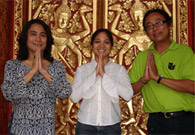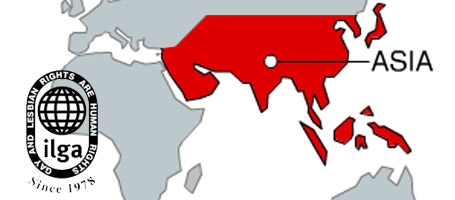Should we book our tickets to Chiang Mai, Jan 24-27, for ILGA-ASIA3? What will we find??? - the lonely stepdaughter of ILGA-Europe living in exile in the tropics? - or an Asian Snow White, waiting for her princes, princesses, toms, dees, kathoeys, waria, bakla and hijra to awaken her from her sleep?

Sulastri Ariffin, Mira Ofreneo & Aung Myo Min, ILGA Asia reps on ILGA's world Board. Photo from www.ilga.org
I was prepared to forgive the organisational glitches. The location of the conference had shifted and I traveled halfway across Paris the first day only to find an empty hall. The local host organisation fell apart right after the conference, so the minutes of the business sessions were never written up. A gap in ILGA records? Probably one of dozens.
The few old ILGA hands at the Paris meeting complained that it was the worst organised world conference they could remember. That was lesson # 1 for me. ILGA meetings have wonderful people and great camaraderie, but good organisation cannot be assumed.
ILGA has over 600 members in all regions of the world. There are six ILGA regions - Europe, North America, Latin America, Africa, Australasia and Asia.
When I first met ILGA leaders they had no experience with the United Nations. I spoke for ILGA at a UN meeting in Geneva in 1992. The next year a small group of us ILGA types got accredited to the UN World Conference on Human Rights in Vienna. A beginning had been made at the UN.
But it is others, not ILGA, that have taken the lead at the UN. One of the small 1993 group was John Fisher, who is now the first full-time resident LGBT lobbyist in Geneva under the name Arc-International. Other UN players are based in the International Service for Human Rights and the International Commission of Jurists. ILGA, along with Human Rights Watch, the US based International Gay and Lesbian Human Rights Commission and Amnesty International play supporting roles in Geneva.
What of the ILGA regions? ILGA-Europe gets funding from various parts of the European human rights system. It has offices, a paid staff and publications. The 2007 ILGA-Europe annual conference in Vilnius, Lithuania, in November was its eleventh. ILGA-Europe is an effective player in European human rights developments.
The American's have largely ignored ILGA. The large US organisations are not active members. ILGA-World has met there a few times, most notably in New York on the 25th anniversary of the Stonewall riots in 2004. There has never been an ILGA-North America meeting. I have never heard of an ILGA-Australasia meeting.
ILGA met in Rio de Janiero in 1995. Now there seems an active ILGA-LAC, for Latin American and the Caribbean. The first ILGA-Africa conference was held in 2007.
The ILGA-Asia region was, of course, completely different than the others. It was far far larger, in size and population. And much more complex in cultural and political terms. Asia has no regional human rights institutions - not even at the sub-regional levels of Association of South East Asian Nations (ASEAN) or South Asian Association for Regional Cooperation (SAARC).
In the 1990s Asia was famous for the challenge by some leaders to the universality of "so-called" international human rights standards. Lee Kwan Yew and Mohammad Mahathir promoted "Asian values." Singapore openly mocked "international" standards at the 1993 Vienna conference, even dumping on "gay marriage."
The story of ILGA-Asia is largely unknown.
In 1984, Minami Teishiro, the affable publisher of the gay magazine Adon, formed JILGA, the Japanese International Lesbian and Gay Association. I think he had been at the Stockholm ILGA-world conference, and apparently the head of ILGA had visited Japan.
Minami vowed to form an Asian regional grouping within ILGA. He held two meetings in Japan and a final one in Bangkok in 1990. He and I won the 'condom putting on contest' held at Once Upon a Time restaurant. But attendance at the meeting was perhaps fifteen, including non-Asians. There was no funding to cover travel. Letters did arrive from South Korea and Hong Kong. The next meeting was to be in Indonesia. It was never held.
The first real ILGA-Asia meeting was in Mumbai in the fall of 2002. The host was Ashok Row Kavi, the pioneering head of Humsafar Trust and publisher of Bombay Dost magazine. The planning hit the tectonic plates of the then very strong antagonism between the groups that linked to Ashok and the groups that linked to Naz Foundation and Shivanada Khan.
I sat in my office at the University of British Columbia in Canada amazed at the daily flood of angry emails shooting back and forth on the Indian LGBT lists. One activist later complained "ILGA never even consulted us."
"Don't you understand," I said. "ILGA-World has one paid staff person in Brussels, and there is no paid staff for ILGA-Asia." Local activists did not know. Only a few people in India understood anything about ILGA.
It seems that 50 percent of the LGBT organisations in India boycotted the Mumbai conference. About 80 delegates participated, and I remember the sessions as very positive. It was better organised than the Paris conference ten years earlier.
ILGA-World finally gained an Asian leader. Anna Leah Sarabia of CLIC in the Philippines. She had been the female Asian representative, and went on to become female secretary-general of ILGA-World. ILGA maintains both male and female slots at each level of its political structure. Anna Leah, without consulting any other Philippino organisations, invited ILGA-World to meet in Manila.
The ILGA-World conference in Manila was the smallest world conference I had seen and badly organised. Anna Leah Sarabia had been a pioneering figure, but a very divisive one. Most of the Philippine LGBT organisations boycotted the conference. If they had come, the conference would have been a success. Such a missed opportunity.
Anna Leah organised ILGA-Asia2 in Cebu, the Philippines, in, I think, 2005. Apparently about 60 people attended. That meeting chose the current ILGA-Asia representatives on the ILGA-World board, Mira Ofreneo, a psychology professor representing CLIC in the Philippines, and Myo Min, a Burmese democracy activist, based in Chiang Mai, Thailand.
I met Mira and Myo for the first time at the ILGA-World conference in 2006 in Geneva, Switzerland. Both were charming and optimistic. The Geneva conference was very well organised. There were excellent panels on UN reform and on Islam and homosexuality. A lot of planning had gone into the event.
I assumed that planning for ILGA-Asia3 would begin soon, and tried to interest Bangkok based LGBT organisations in getting involved. Perhaps I went about it the wrong way. Like this column, I talked about the problems that had occurred earlier in trying to create a working Asian region of ILGA - including the 'dirty laundry' of the boycotts in Mumbai and Manila. And I don't speak or write Thai.
My hope was that local activists would see the Chiang Mai meeting as a chance to build something - recognising that nothing was yet built. It seemed to me that ILGA-World and ILGA-Asia had no capacity to deliver a successful event without local support. I wanted to encourage that support.
My efforts failed miserably. Some ILGA people were angry with me for telling stories of past problems. An initial planning meeting in Chiang Mai in November, 2006, was actually closed to local organisations. We could be "briefed" at the end if we wanted.
Local activists, on the other hand, showed little or no interest. They had no background experience with ILGA and weren't interested in my history lessons. I backed off. The white guy in Bangkok shut up. For a while, at least.
Rosanna Flamer-Caldera of Sri Lanka, the new female secretary-general of ILGA, put off the date of the ILGA-Asia meeting from 2007 to the beginning of 2008, saying this would allow more European funding to cover travel costs for delegates. A second planning meeting took place in Chiang Mai in August, 2007. M-Plus, the local gay-run AIDS organisation in Chiang Mai was now part of the planning. The Bangkok groups were still out of the loop, by choice and by default.
Thailand is famous for tolerance, but has very few LGBT organisations. Most activists are not fluent in English. No Thai organisations are members of ILGA. I, a non-Thai, living in Bangkok, am a member under an organisational name. Myo Min, a non-Thai, is a member under an organisational name. Anjaree is listed by ILGA as a member, but never made an organisational decision to join. How odd to hold ILGA-Asia in Thailand where there were no Thai member organisations.
For a year there was apparently little planning. Both Mira and Myo have full time jobs. Any work for ILGA-Asia is as unpaid volunteers. That is true of the two world-level secretaries general, as well as those at regional levels. Mira had to care for a dying relative. Myo, active on democracy issues in Burma, was responding to the demonstrations and repression back home in the fall of 2007. No real planning was getting done. The first generally circulating notices of the meeting came out probably in October.
In November the first outside speaker was invited. More publicity about the conference went out on web lists. New organisations in Japan have joined ILGA and are planning to come. There is some money for scholarships. Maybe the conference will fall into place, but without the kind of advance planning that went into the Mumbai and Geneva meetings.
In November and December 2007 it was still difficult to get information, even on the hotel where the conference was to be held. Little help came from ILGA websites. By December applications for scholarships were being processed, a bit over a month before the conference.
Margaret Thatcher, the "iron lady" of British politics, was famous for killing debate by announcing TINA - "there is no alternative." The only alternatives to ILGA-Asia are the AP-Rainbow email list, the LGBT satellite meetings at regional and international AIDS conferences, fridae.com and irregular academic conferences like the big one in Bangkok in 2005.
We can all live without ILGA-Asia, of course, but it would be nice to be in touch with each other in this vast area. And I have never been at an LGBT conference, whether badly organised or not, where I have not felt warmth and solidarity with others. And Chiang Mai is a lovely town.
Douglas Sanders is a retired Canadian law professor, living in Bangkok. He can be contacted at sanders_gwb@yahoo.ca.












 列印版本
列印版本













讀者回應
To be an empty vessal making the largest voice so as to hasten the execution of gay related prisoners in draconia countries.
請先登入再使用此功能。